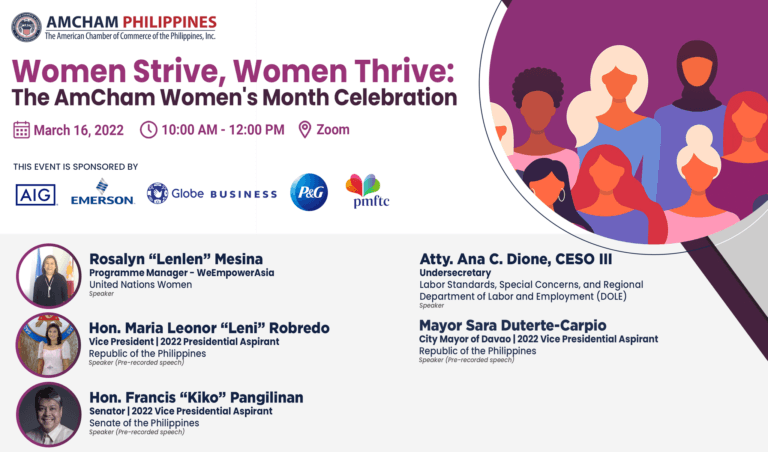Rosalyn Mesina, UN Women Philippines Programme Manager for WeEmpowerAsia, was the first resource speaker of “Women Strive, Women Thrive”, a web event hosted by the American Chamber of Commerce of the Philippines in celebration of Women’s Month. She spoke about the advocacy of UN Women, a UN organization dedicated to gender equality and women empowerment. The following are the organization’s focus areas:
- Leadership and Governance—where women lead, participate in, and benefit equally from the governance system
- Economic Empowerment—to ensure that women have income security, decent work, and economic autonomy
- Ending Violence Against Women—to ensure that all women and girls live a life free from all forms of violence
- Peace, Security, and Humanitarian Action—because women and girls have greater influence in building peace and resilience
Through Women Empowerment Principles, businesses should be built in such a way that it works for women. In Asia-Pacific economies, women are present throughout value chains as producers, business owners, executives, employees, distributors, and consumers; however, they face significant barriers in the region. If the region continues at the 2006–2019 pace of change, closing the economic gender gap will take 100 years.

Where do women in the Philippines work pre and post-COVID?

Here are some of the legal frameworks promoting women empowerment in the Philippines:
- Universal Declaration of Human Rights (UDHR)
- Convention on Elimination of Discrimination Against Women (CEDAW)
- National Laws:
- RA 7192: Women in Development and Nation Building Act
- RA 7877: Anti-Sexual Harassment Act of 1995
- RA 8353: The Anti-Rape Law of 1997
- RA 9208: Anti-Trafficking in Persons Act of 2003
- RA 10354: The Responsible Parenthood and Reproductive Health Act of 2012
- RA 9710: The Magna Carta of Women
- RA 11210: 105-Day Expanded Maternity Leave Law
- RA 8972: Solo Parents’ Welfare Act of 2000
- Business
- ILO Standards
- UN Guiding Principles on Responsible Business Conduct
- Women Empowerment Principles
Supporting women empowerment benefits business, drives economic growth, and supports business performance and resilience through innovation, which is six times higher in companies where men and women are treated equally; cost savings; and productivity, where more diverse companies have lower turnover rates. Factories that invest in women empowerment see a 22% decrease in the number of products that require rework and a 4.5% decrease in turnover rates. On market growth, women account for US$20 trillion in consumer spending per year and is the fastest-growing consumer economy. By 2028, women will control close to 75% of discretionary spending worldwide.
UN Women presented Women Empowerment Principles (WEP), which was launched in 2010 by UN Global Compact and UN Women. The framework is to guide all businesses—regardless of size, sector, and geography—to empower women in the workplace, marketplace, and community.
- Principle 1: Establish high-level corporate leadership for gender equality
- Principle 2: Treat all women and men fairly at work – respect and support human rights and nondiscrimination
- Principle 3: Ensure the health, safety and well-being of all women and men workers
- Principle 4: Promote education, training and professional development for women
- Principle 5: Implement enterprise development, supply chain and marketing practices that empower women
- Principle 6: Promote equality through community initiatives and advocacy
- Principle 7: Measure and publicly report on progress to achieve gender equality
The UN is currently building the WEP Community in the Philippines.
The second resource speaker was Atty. Karina Perida-Trayvilla, Director IV for the Bureau of Workers with Special Concerns of the Department of Labor and Employment (DOLE), who spoke about issues women face and how DOLE addresses them. The common issues are as follows:

The following laws are available to protect women from crimes and violence in the workplace:
- RA 7877: Anti-Sexual Harassment Act of 1995–first law governing work, education, or training institution-related sexual harassment cases
- RA 11313: Safe Spaces Act–supplements RA 7877 and provides mechanisms for the protection of both sexes in virtually all kinds of spaces
Atty. Trayvilla also shared about Gender-Based Sexual Harassment (GBSH) in the workplace, an act involving a series of unwelcome sexual advances, requests, or demands for sexual favors or any act of sexual nature that could have a detrimental effect on the individual’s employment, job performance, or opportunities.

In closing, women’s full participation in every sector should be the norm now. Equal treatment of men and women is not just the right thing to do, but should be the standard of society. “Women empowerment is not about making women strong, because they already are. It’s about changing the way the world perceives that strength.”-G.D. Anderson
Please visit and join the John Clements Talent Community.





